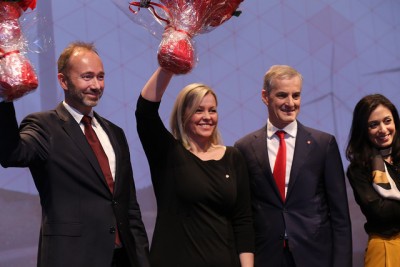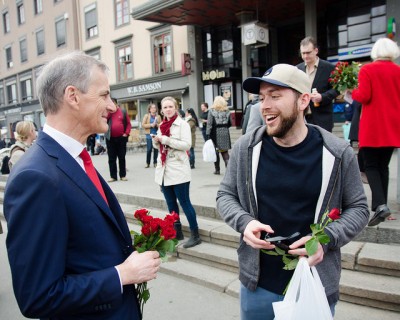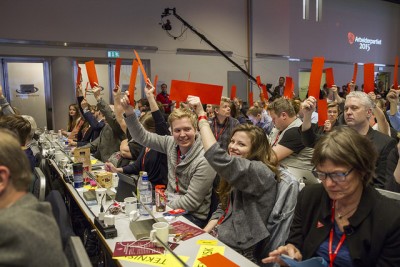NEWS ANALYSIS: The Norwegian Labour Party threw what an opposition politician likened to a “home alone” party during the weekend. Under new leadership, the party shifted its position on no less than 14 issues and launched new proposals that would cost taxpayers billions. It’s all aimed at winning local elections this fall, and regaining government power at the next national election in 2017.

Opponents and several media commentators warned it could result in an enormous hangover instead.
“A ‘home alone’ party is perhaps the best description of what we saw at Labour’s national annual meeting,” Ketil Solvik-Olsen, the jovial Progress Party politician who currently serves in Norway’s Conservatives-led government as transport minister, told newspaper Dagens Næringsliv (DN). “As soon as (former Prime Minister Jens) Stoltenberg left the house, they (launch a big party) and go shopping for it. Everything they earlier have said was irresponsible, they now choose to buy after all. They came up with a new government expenditure every 10 minutes. They just kept shopping, even on a Sunday.”
The Labour Party remained opposed to allowing all other Norwegians to shop on Sundays but newspaper Aftenposten chronicled 14 issues where Labour did indeed do as Solvik-Olsen claimed, and changed their position. In addition to dramatically easing their earlier strict policy on accepting refugees, including 10,000 from Syria, party delegates voted to:
** provide a warm meal at school for all elementary, junior high and high school students, while maintaining current levels of the monthly welfare payments made to all parents in Norway. It was unclear how all that would be funded. Their former government partner in Norway’s previous left-center coalition, the Socialist Left (SV), tried to win Labour’s support for school meals during both of their terms in office over eight years, but only now, in opposition, has Labour changed its view.
** approve new and likely lower class-size limits to relieve teachers’ exhaustion. That will require hiring many more teachers and providing more classrooms around the country.
** launch an obligatory vaccination program of children and youth in Oslo. This proposal, and its rapid approval, came as a shock to those Labour delegates who believe vaccinations should be voluntary.
** launch a new heroin-assisted treatment program that would provide free heroin to addicts. The party’s Members of Parliament had gone along with heroin-assisted treatment last year, but the weekend’s vote expands the original idea.
** earmark funding for elder care, instead of entirely leaving it up to municipal governmets. Labour has otherwise opposed earmarking state funding for the past 10 years.
** evaluate whether the giant state hospital agency for southeast Norway, Helse Sør-Øst, should be split up into potentially more easily manageable units. It was set up during the administration of Labour Health Minister Sylvia Brustad during Stoltenberg’s government in 2007, and carried on under her Labour successors including new Party Leader Jonas Gahr Støre, with responsibility for hospitals in 10 counties that serve 2.7 million Norwegians.
** recognize small local hospitals as a vital part of Norway’s public health system, and make effort to provide hospital services as close to people’s homes as possible. Labour was hit with strong criticism for its proposal to shut down local hospitals when it held government power.
** recognize homosexual blood donors on an equal basis as heterosexuals. Labour earlier has opposed this.
** maintain Norway’s duty-free (called “taxfree”) system for Norwegians who have traveled abroad, but have it taken over by the state liquor monopoly (Vinmonopolet) when the current operator’s contract runs out in 2022. Duty-free sales at Norwegian airports help finance airport improvements and operations and Labour stopped short of abolishing the system, as recommended by its internal health commission. Party members demanded, though, that duty-free sales be less obtrusive at the airport. Even though Norway’s restrictive alcohol policies are aimed at reducing sales and consumption, politicians have been alarmed that full-price sales at Vinmonopolet’s outlets have declined. They claim it’s because more and more Norwegians are traveling and able to buy cheaper booze elsewhere.
** have the state offer to cover 70 percent of the funding needed for new public transport projects in Norway’s biggest cities. The state, also under the former Labour governments, has earlier only been willing to pay a much lower share.
** ensure that the current Conservative government’s program to merge Norway’s municipalities into much large local government entities is only done on a voluntary basis. Labour earlier has wanted to force uninterested municipalities to merge if all their neighbours want to do so.
** recognize Palestine as its own state regardless of the outcome of negotiations between the Israelis and the Palestinians. Labour earlier has been an ardent supporter of Israel when it was under its own Labour Party rule, but recent years of harder-line policies under Israel’s conservative government have changed the Norwegian party’s outlook. The last Labour-led government turned more critical towards Israel’s policies, and Stoltenberg upset the US’ Bush Administration for sending Raymond Johansen (then a state secretary under Støre in the Foreign Ministry, now Labour’s candidate for mayor of Oslo) to Gaza to meet with Hamas after it won democratic elections. This weekend’s decision to recognize Palestine like Sweden has done goes a step farther, and raised immediate objections from Israel’s ambassador to Norway.

The questions raised after Labour’s annual meeting involved mostly how the party intends to fund all of its new initiatives and programs that it once deemed too expensive while in government. The party’s newly elected deputy leader Hadia Tajik had a hard time answering direct questions on the subject during a political debate on national radio Monday morning, telling NRK that the numbers still needed to be crunched. “We haven’t sat down and accounted for all the proposals in detail,” Tajik said, “but we know that our latitude for negotiation is many billions more than the government’s.”
Both she and Støre seemed confident that state funds would be available, provided the current conservative government doesn’t cut more taxes. Both were vague as to whether they would reinstate taxes that already have been cut, for example on inheritance.

Labour’s change of position on so many issues also has raised speculation that it’s planning or renewing alliances with other parties, including both the Socialist Left (SV) and the Center Party, both of which shared power with Labour from 2005 until 2013. The rural-oriented Center Party, for example, supported local hospitals just like SV supported meals at school, only to be voted down by Labour. Newspaper Dagsavisen suggested on Monday that Labour will be forming alliances in Oslo, Stavanger, Bergen and Bodø in a bid to win political power in those cities. Even though Labour ranks as Norway’s largest political party, it only holds power in three of the country’s 10 largest cities.
Jonas Gahr Støre, meanwhile, was introduced as Norway’s next prime minister when he took the podium last Thursday. He continues to catch criticism, however, for being vague on many issues and failing to launch tougher climate- and environmental programs that would rein in the oil and gas industry. Labour’s environmental policies are still referred to as “too passive.” Even though his party is heading into local elections this fall with record high numbers in public opinion polls, public sentiment can change quickly. The campaign, at any rate, is clearly underway.
newsinenglish.no/Nina Berglund

